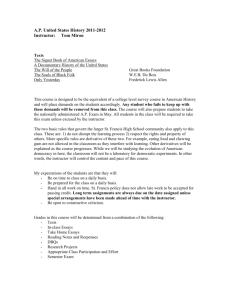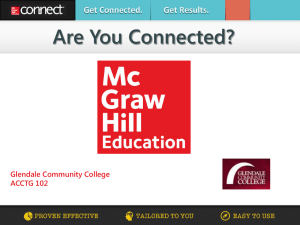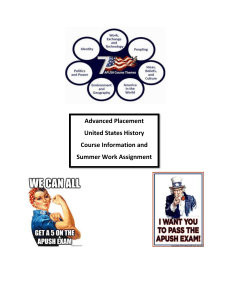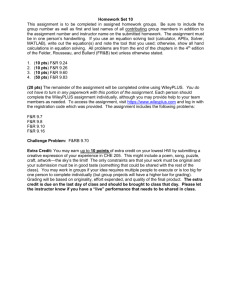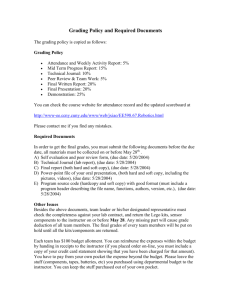HIST 1302: U.S. History Since 1877
advertisement
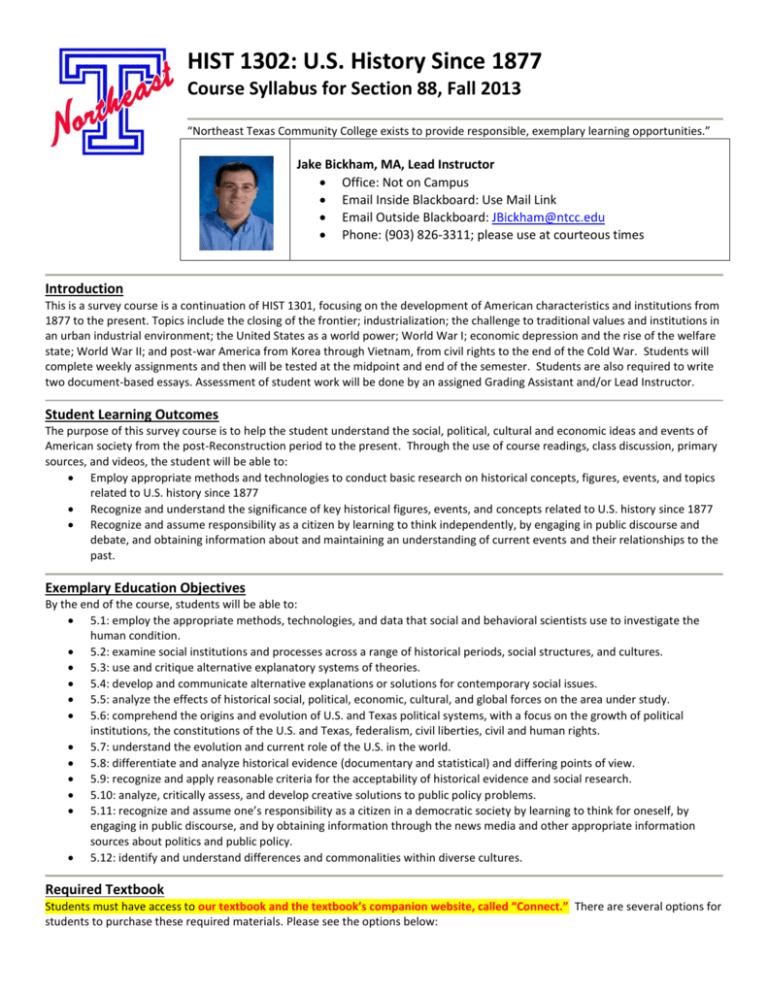
HIST 1302: U.S. History Since 1877 Course Syllabus for Section 88, Fall 2013 “Northeast Texas Community College exists to provide responsible, exemplary learning opportunities.” Jake Bickham, MA, Lead Instructor Office: Not on Campus Email Inside Blackboard: Use Mail Link Email Outside Blackboard: JBickham@ntcc.edu Phone: (903) 826-3311; please use at courteous times Introduction This is a survey course is a continuation of HIST 1301, focusing on the development of American characteristics and institutions from 1877 to the present. Topics include the closing of the frontier; industrialization; the challenge to traditional values and institutions in an urban industrial environment; the United States as a world power; World War I; economic depression and the rise of the welfare state; World War II; and post-war America from Korea through Vietnam, from civil rights to the end of the Cold War. Students will complete weekly assignments and then will be tested at the midpoint and end of the semester. Students are also required to write two document-based essays. Assessment of student work will be done by an assigned Grading Assistant and/or Lead Instructor. Student Learning Outcomes The purpose of this survey course is to help the student understand the social, political, cultural and economic ideas and events of American society from the post-Reconstruction period to the present. Through the use of course readings, class discussion, primary sources, and videos, the student will be able to: Employ appropriate methods and technologies to conduct basic research on historical concepts, figures, events, and topics related to U.S. history since 1877 Recognize and understand the significance of key historical figures, events, and concepts related to U.S. history since 1877 Recognize and assume responsibility as a citizen by learning to think independently, by engaging in public discourse and debate, and obtaining information about and maintaining an understanding of current events and their relationships to the past. Exemplary Education Objectives By the end of the course, students will be able to: 5.1: employ the appropriate methods, technologies, and data that social and behavioral scientists use to investigate the human condition. 5.2: examine social institutions and processes across a range of historical periods, social structures, and cultures. 5.3: use and critique alternative explanatory systems of theories. 5.4: develop and communicate alternative explanations or solutions for contemporary social issues. 5.5: analyze the effects of historical social, political, economic, cultural, and global forces on the area under study. 5.6: comprehend the origins and evolution of U.S. and Texas political systems, with a focus on the growth of political institutions, the constitutions of the U.S. and Texas, federalism, civil liberties, civil and human rights. 5.7: understand the evolution and current role of the U.S. in the world. 5.8: differentiate and analyze historical evidence (documentary and statistical) and differing points of view. 5.9: recognize and apply reasonable criteria for the acceptability of historical evidence and social research. 5.10: analyze, critically assess, and develop creative solutions to public policy problems. 5.11: recognize and assume one’s responsibility as a citizen in a democratic society by learning to think for oneself, by engaging in public discourse, and by obtaining information through the news media and other appropriate information sources about politics and public policy. 5.12: identify and understand differences and commonalities within diverse cultures. Required Textbook Students must have access to our textbook and the textbook’s companion website, called “Connect.” There are several options for students to purchase these required materials. Please see the options below: Experience History: Interpreting America’s Past (Complete volume) Hardcover textbook that can be used for 1301 and 1302 courses Author: Davidson, et. al. Publisher: McGraw-Hill ISBN: 0073385670 / 9780073385679 Experience History: Interpreting America’s Past, Vol II Paperback textbook that can be used for 1302 course only Author: Davidson, et. al. Publisher: McGraw-Hill ISBN: 0077368320 / 9780077368326 CONNECT – 2 Term Online Access for Experience History Provides access to Experience History’s companion website for 360 days ISBN: 0077487281 / 9780077487287 CONNECT PLUS – 2 Term Online Access for CONNECT and eText (online textbook) Provides access to Experience History’s companion website and the complete online textbook for 360 days Author: Davidson, et. al. Publisher: McGraw-Hill ISBN: 007748729X / 9780077487294 Course Requirements Course Organization Students will study chapters organized as follows: Unit 1: Chapters 18 Unit 2: Chapters 19 and 20 Unit 3: Chapters 21 and 22 Unit 4: Chapters 23 and 24 Document Based Essay #1 Midterm Unit 5: Chapters 25 and 26 Unit 6: Chapters 27 and 28 Unit 7: Chapters 29 and 30 Unit 8: Chapters 31 and 32 Document Based Essay #2 Final Grades will be determined through a combination of assignments which will include Discussion Board postings, LearnSmart Exercises, Document-Based Essays and Examinations. Discussion Boards Students will be required to participate in a Discussion Board for each Unit of study. Discussion Board Topics will be based on the contemplation of a historical topic and the examination of primary source documents. Participation will include students responding directly to the posted historical question (initial post) as well as commenting on the posts of at least ONE fellow classmate (response post). All posts should be free from grammatical and typical errors. Initial and Response Posts must be at least 100 words in length. Students must make their own initial post, prior to viewing and responding to the posts of other students. Please note that meeting the minimum requirements in the number of posts and the length of posts will not ensure students full credit. Please see the course website for more specific instructions. Each Unit’s postings will be worth 100 points each, and comprise 20% of a student’s final grade for this course. LearnSmart Exercises Students will be required to complete the LearnSmart Exercises for each assigned chapter. LearnSmart is a study tool which helps students to review chapter material. Grades are based on completion of the Module, not by correct/incorrect answers (i.e. if a student completes only 70% of the Module by the due date, then the student receives a 70 %; if a student completes 100% of the Module by the due date, then the student receives a 100%). Please see the course website for more specific instructions. LearnSmart Exercises will be worth 100 points each, and comprise 20% of a student’s final grade for this course. Document-Based Essays Students will be required to complete 2 document-based essays. This assignment is very similar to the weekly Discussion Boards, with the only difference being that instead of posting a 100-word response, students will be writing an essay response (500-750 words). The weekly Discussion Board discussions will provide students with the opportunity to practice and hone their skills before having to provide a “longer,” more organized and well-supported essay response. Students will be presented with numerous topics from which they will select one on which to write. Essays must be answered based on the documents provided, and/or other course material (discussion board materials and textbook). The use of outside materials is strictly forbidden. The first document-based essay will be due at the time of the Midterm; the second will be due at the time of the Final Exam. Please see the course website for more specific instructions. Each essay will be worth 100 points, and together they will comprise 20% of a student’s final grade for this course. Examinations Students will be required to complete a Midterm and a Final Examination. Each Exam will be comprised of 100 questions (multiple choice, matching, fill in the blank, etc.) – broken into two parts, 50 questions each, covering only certain chapters, to be completed within 90 minutes: Midterm Part A Part B 50 Questions 50 Questions Covering Unit 1 & 2 Covering Unit 3 & 4 90 minutes 90 minutes 200 pts (50 question x 4 pts each) 200 pts (50 question x 4 pts each) Final Part A Part B 50 Questions 50 Questions Covering Unit 5 & 6 Covering Unit 7 & 8 90 minutes 90 minutes 200 pts (50 question x 4 pts each) 200 pts (50 question x 4 pts each) Students must take Part A & B online through Blackboard/Connect using the Respondus Lockdown Browser. Please see the course website for more specific instructions. Each Exam will be worth 400 pts each, and comprise 20% of the student’s final grade for this course. Course Grading Policy Course Grades will be determined by the following: LearnSmart Exercises: Discussion Boards: Midterm Exam: Final Exam: Document-Based Essays 20% 20% 20% 20% 20% 100% Grade Scale: A = 90% - 100% B = 80% - 89% C = 70% - 79% D = 60% - 69% F = 59% & below Course Gradebook: Students may review their grades by clicking on the “My Grades” link on the Course Menu. Grading Grievances Any student who has a concern or dispute regarding the grading of an assignment should discuss their concern with their assigned Grading Assistant first. If the issue cannot be resolved, then the Lead Instructor should be consulted. Please note that the Grading Assistant works under the direction of the Lead Instructor, utilizing guidelines and rubrics on which to assess grades. The Lead Instructor is solely responsible for grading policies and has the ultimate authority over student grades. Late Assignment Policy Assignments not submitted by the due date and time will be counted as LATE. This is non-negotiable unless TWO conditions are met: 1. A valid excuse is provided 2. The student must contact the instructor with the valid excuse, prior to the assignment’s due date and time. A valid excuse does not include internet problems or lack of internet access. All students must have reliable and consistent access to the internet throughout the duration of this course. Late Deductions are determined for each 24 hour period past the due date, as follows: Discussion Boards – 10% deduction Document-Based Essays – 25% deduction LearnSmart Modules cannot be submitted late! Students who cannot complete the LearnSmart Modules by the due date earn grades based on the percentage of the Module completed. . If a student completes only 70% of the Module by the due date, then the student receives a 70 %. A student with a valid excused by contact the instructor prior to the due date to request an extension. Midterm and Final Exams cannot be submitted late! Students who cannot complete the work by the due date must contact the instructor with a valid excuse prior to the due date and will be made to complete a make-up exam once the excuse has been verified. NTCC Academic Honesty Statement “Students are expected to complete course work in an honest manner, using their intellects and resources designated as allowable by the course instructor. Students are responsible for addressing questions about allowable resources with the course instructor. NTCC upholds the highest standards of academic integrity. This course will follow the NTCC Academic Honesty policy stated in the Student Handbook.” Academic Ethics The college expects all students to engage in academic pursuits in a manner that is beyond reproach. Students are expected to maintain complete honesty and integrity in their academic pursuit. Academic dishonesty such as cheating, plagiarism, and collusion is unacceptable and may result in disciplinary action. Refer to the student handbook for more information on this subject. ADA Statement It is the policy of Northeast Texas Community College to provide reasonable accommodations for qualified individuals who are students with disabilities. This College will adhere to all applicable federal, state and local laws, regulations and guidelines with respect to providing reasonable accommodations as required to afford equal educational opportunity. It is the student’s responsibility to arrange an appointment with a College counselor to obtain a Request for Accommodations form. For more information, please refer to the Northeast Texas Community College Catalog or Student Handbook. Family Educational Rights and Privacy Act (FERPA) The Family Education Rights and Privacy Act (FERPA) is a federal law that protects the privacy of student education records. The law applies to all schools that receive funds under an applicable program of the U.S. Department of Education. FERPA gives parents certain rights with respect to their children’s educational records. These rights transfer to the student when he or she attends a school beyond the high school level. Students to whom the rights have transferred are considered “eligible students.” In essence, a parent has no legal right to obtain information concerning the child’s college records without written consent of the student. In compliance with FERPA, information classified as “director information” may be released to the general public without written consent of the student unless the student makes a request in writing. Directory information is defined as: the student’s name, permanent address and/or local address, telephone listing, dates of attendance, most recent previous education institution attended, other information including major, field of study, degrees, awards received, and participating in officially recognized activities/sports. Changes to the Syllabus The information contained in this syllabus is subject to change without notice. Students are expected to be aware of any additional course policies presented by the instructor during the course.

